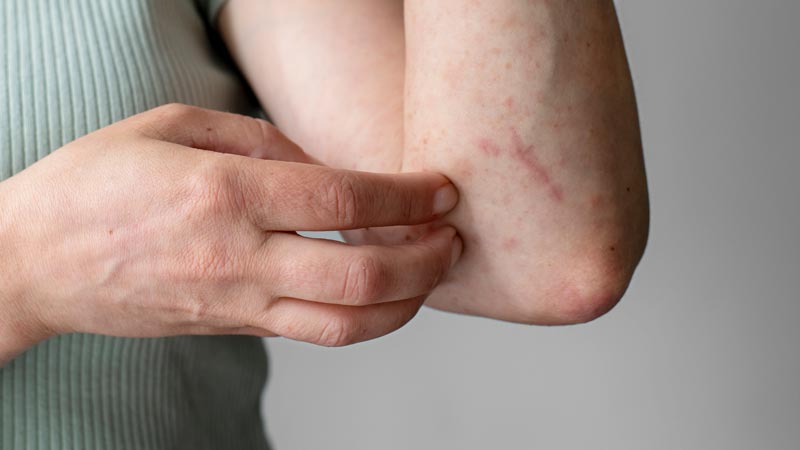
Top 6 Home Remedies for Tick Bites and When to Seek Urgent Care in Norwalk, CT
Tick bites can be more than just a minor nuisance. These tiny parasites latch onto your skin, feed on your blood, and can potentially transmit serious diseases. Each year, around 50,000 cases of tick-borne diseases are reported in the United States. Knowing how to treat a tick bite promptly and effectively is crucial. Here are the top home remedies for tick bites and essential information on when to seek urgent care in Norwalk, CT.
Table of Contents
Key Takeaways✔ Tick bites occur when ticks pierce the skin and draw blood, often resulting in redness, swelling, and itching. ✔ Ticks can transmit serious illnesses such as Lyme disease, anaplasmosis, babesiosis, and ehrlichiosis, making early detection and treatment critical. ✔ Clean the bite area with mild soap and water, then disinfect with rubbing alcohol to prevent infection. ✔ Apply antibiotic ointment and cover with a bandage to protect the bite site and promote healing. ✔ Use ice packs to reduce swelling and numb pain immediately after a tick bite. ✔ Apply aloe vera gel to soothe and heal the tick bite, reducing inflammation and irritation. ✔ Vitamins C and E help boost the immune system and repair skin, aiding in the healing process. ✔ Apply olive leaf extract topically or take supplements to fight bacteria and viruses, reducing infection risk. |
What Are Tick Bites?
A tick bite happens when a tick pierces your skin with its mouthparts and begins to draw blood. Ticks are commonly found in wooded or grassy areas and can attach to humans and animals who venture into these environments. Common symptoms of a tick bite include redness, swelling, and itching at the bite site.
Ticks are known vectors for several serious illnesses. Lyme disease, one of the most common tick-borne diseases, can cause severe joint pain, neurological problems, and heart issues if left untreated. In 2022, state health departments and the District of Columbia reported over 63,000 cases of Lyme disease to the Centers for Disease Control and Prevention (CDC).
Other diseases transmitted by ticks include anaplasmosis, babesiosis, and ehrlichiosis. Early detection and treatment are vital to prevent complications, making it crucial to monitor tick bites closely and seek medical attention from urgent care in Norwalk, CT, if necessary.
6 Home Remedies for Tick Bites
When dealing with tick bites, using home remedies can provide immediate relief and aid in preventing infections. Here are six effective remedies to treat tick bites at home.
1. Soap and Rubbing Alcohol
One of the first steps in treating a tick bite at home is to clean the area thoroughly. Using soap and rubbing alcohol can help prevent infection and soothe the skin.
How to Use
- Step 1: Wash the bite area with mild soap and warm water. Gently scrub to remove any dirt or debris.
- Step 2: After cleaning with soap and water, apply rubbing alcohol to the bite site using a cotton ball or swab. This helps disinfect the area and reduce the risk of infection.
Benefits
Cleaning the bite area with soap removes surface bacteria while rubbing alcohol acts as an antiseptic to kill any remaining germs. This helps prevent infection and keeps the bite site clean, reducing the risk of complications. If you are unsure about the severity of the bite, it’s always wise to consult urgent care in Norwalk, CT.
Additional Tips
- Ensure you use a mild soap that does not irritate the skin.
- Avoid using harsh chemicals that could cause further skin irritation.
- Rubbing alcohol can sometimes sting; if it’s too painful, dilute it with water.
2. Antibiotic Ointment
Applying an over-the-counter antibiotic ointment can further help prevent infection and promote healing of the tick bite.
How to Apply
- Step 1: After cleaning the bite area with soap and rubbing alcohol, pat the skin dry with a clean towel.
- Step 2: Apply a small amount of antibiotic ointment, such as Neosporin, directly to the bite site.
- Step 3: Cover the area with a sterile bandage to keep it clean and protected.
Benefits
Antibiotic ointments contain ingredients that help kill bacteria and prevent infection. Using these ointments can reduce redness, swelling, and discomfort at the bite site. It’s especially beneficial for those prone to skin infections or if the bite appears red and irritated. If symptoms persist, visit urgent care in Norwalk, CT, for further evaluation.
Additional Tips
- Change the bandage daily to keep the wound clean.
- Reapply the antibiotic ointment each time you change the bandage.
- Watch for signs of allergic reactions to the ointment, such as increased redness or itching.
3. Ice
Ice is a simple yet effective remedy for reducing swelling and numbing the pain associated with tick bites.
Application Method
- Step 1: Wrap a few ice cubes in a clean cloth or use a cold pack.
- Step 2: Apply the ice pack to the bite area for about 15 minutes.
- Step 3: Remove the ice pack and wait for 10 minutes before reapplying if needed.
Benefits
Applying ice helps constrict blood vessels, which reduces inflammation and numbs the area, providing relief from pain and itching. This is particularly useful immediately after removing the tick. For severe reactions or persistent symptoms, seek urgent care in Norwalk, CT.
Additional Tips
- Do not apply ice directly to the skin to avoid frostbite.
- Limit ice application to 15-minute intervals to prevent skin damage.
- Monitor the bite area for any changes that might require medical attention.
4. Aloe Vera
Aloe vera is well-known for its soothing and healing properties, making it an excellent remedy for tick bites.
How to Use
- Step 1: If you have an aloe vera plant, cut a small section of the leaf and extract the gel. Alternatively, use store-bought aloe vera gel.
- Step 2: Apply a generous amount of aloe vera gel directly to the bite site.
- Step 3: Allow the gel to dry on the skin. Reapply as needed to soothe irritation.
Benefits
Aloe vera has anti-inflammatory and antimicrobial properties that help reduce swelling, soothe itching, and promote healing. It also moisturizes the skin, preventing dryness and irritation around the bite area. If the bite worsens or does not improve, consider visiting urgent care in Norwalk, CT.
Additional Tips
- Use fresh aloe vera gel for the best results.
- Store-bought aloe vera gels should be free from additives and fragrances.
- Reapply aloe vera gel several times a day for continuous relief.
5. Vitamins
Certain vitamins can boost your immune system and aid in the healing process of tick bites.
Recommended Vitamins
- Vitamin C: Known for its immune-boosting properties, Vitamin C helps reduce inflammation and promotes faster healing.
- Vitamin E: This vitamin helps repair damaged skin and reduces scarring.
How to Use
- Step 1: Consume foods rich in Vitamin C, such as oranges, strawberries, and bell peppers.
- Step 2: Take Vitamin E supplements or apply Vitamin E oil directly to the bite site.
Benefits
Vitamins C and E help the body fight off infections and repair damaged tissues. Regular intake of these vitamins can enhance the healing process and minimize the risk of complications from tick bites. For advice on vitamin supplementation and tick bite care, contact urgent care in Norwalk, CT.
Additional Tips
- Consult with an urgent care in Norwalk, CT, before starting any new supplements.
- Monitor the bite site for any signs of irritation or allergic reactions.
6. Olive Leaf Extract
Olive leaf extract is a natural remedy with potent antimicrobial properties that can aid in treating tick bites.
Usage Guide
- Topical Application: Apply olive leaf extract directly to the bite site using a cotton ball or swab.
- Oral Supplementation: Take olive leaf extract supplements as directed on the product label.
Benefits
Olive leaf extract contains compounds that help fight bacteria and viruses, reducing the risk of infection. Its anti-inflammatory properties also help soothe the skin and promote healing. If you experience any adverse reactions, consult urgent care in Norwalk, CT.
Additional Tips
- Choose high-quality olive leaf extract products for the best results.
- Follow dosage instructions carefully when taking supplements.
- Monitor the bite site for any signs of adverse reactions
When to Seek Urgent Care in Norwalk, CT
While home remedies can effectively treat minor tick bites, there are situations where professional medical attention is necessary. Knowing when to seek urgent care in Norwalk, CT, can prevent serious health complications.
Signs of Infection
- Redness and Swelling: If the redness and swelling worsen over time, it could indicate an infection.
- Pus or Discharge: Any pus or unusual discharge from the bite site is a sign of infection and needs urgent care in Norwalk, CT.
- Increased Pain and Tenderness: Persistent or increasing pain and tenderness around the bite site.
- Fever or Chills: Developing a fever or experiencing chills after a tick bite can be a sign of a more serious infection that needs urgent care in Norwalk, CT.
Allergic Reactions
- Difficulty Breathing: Any trouble breathing or shortness of breath warrants a visit to urgent care in Norwalk, CT.
- Swelling of the Face, Lips, or Throat: Swelling in these areas can indicate a serious allergic reaction.
- Rapid Heartbeat: An unusually fast heartbeat can be a sign of an allergic reaction.
- Dizziness or Fainting: Feeling dizzy or faint can indicate a severe reaction that requires immediate attention from urgent care in Norwalk, CT.
Persistent Symptoms
If you develop ongoing symptoms such as fever, fatigue, or a rash that spreads from the bite site (a common sign of Lyme disease), it’s crucial to seek medical attention. Early diagnosis and treatment of tick-borne diseases are vital to prevent long-term health issues. Visit urgent care in Norwalk, CT, for a thorough evaluation and treatment plan.
What to Expect At Urgent Care in Norwalk, CT
Visiting urgent care in Norwalk, CT for a tick bite ensures you receive professional medical attention and treatment. Here’s what you can expect during your visit.
- Assessment and Diagnosis: A thorough examination to determine the severity of the bite and any potential infections.
- Administration of Antibiotics: Prescribe antibiotics if an infection is present to prevent further complications.
- Treatment for Allergic Reactions: Offer medications and treatments to manage severe allergic reactions.
- Blood Tests: Perform blood tests to check for tick-borne diseases.
- Advice on Further Prevention and Care: Provide guidance on how to prevent future tick bites and care for the affected area.

Frequently Asked Questions
Is it normal for a tick bite to swell and itch?
Yes, it’s normal for a tick bite to swell and itch due to the body’s reaction to the tick’s saliva. Clean the area and monitor for signs of infection. If the swelling and itching persist or worsen, consider visiting urgent care in Norwalk, CT for evaluation. Using home remedies like ice and aloe vera can help alleviate these symptoms.
How long does a tick itch last?
The itching from a tick bite can last a few days to a couple of weeks. Applying soothing remedies like aloe vera can help reduce the duration of itching. If itching continues beyond this period or is severe, it’s advisable to seek advice from urgent care in Norwalk, CT. Persistent itching may indicate an allergic reaction or infection.
How do you know if a tick’s head is still in your skin?
If a tick’s head is still in your skin, you might see a small black dot at the bite site. If you suspect the head is still embedded, seek urgent care for removal. Leaving the tick’s head in the skin can lead to infection, so professional removal is recommended. Watch for any signs of irritation or infection at the site.
Do all tick bites need antibiotics?
Not all tick bites need antibiotics. Antibiotics are typically prescribed if there are signs of infection or if the tick is known to transmit certain diseases. If you’re unsure whether you need antibiotics, consult with urgent care in Norwalk, CT. They can assess your situation and provide the appropriate treatment based on your symptoms.
Can a tick bite make you sick immediately?
Tick bites usually do not cause immediate illness. Symptoms of tick-borne diseases can appear days to weeks after the bite. Monitor your health and seek urgent care in Norwalk, CT if symptoms develop. Early symptoms may include fever, rash, and fatigue, which require prompt medical attention.
Get Expert Care for Tick Bites at DOCS Urgent Care & Primary Care Norwalk!
If you’re dealing with a tick bite and need prompt, professional care, look no further than DOCS Urgent Care & Primary Care Norwalk. Our experienced healthcare providers are ready to offer comprehensive treatment and advice to ensure your peace of mind. Don’t wait for symptoms to worsen—visit DOCS Urgent Care & Primary Care Norwalk today for the best care in managing tick bites and other urgent health concerns.
Recent Posts
- Top 6 Home Remedies for Tick Bites and When to Seek Urgent Care in Norwalk, CT
- 4 Best Sleeping Positions for Sinusitis Relief: Insights from Urgent Care in Stamford, CT
- 10 Tips for Managing Nausea During Pregnancy: Advice from a Primary Care Doctor in West Hartford, CT
- 6 Essential Steps to Take After a Scorpion Sting – Advice from a Primary Care Doctor in Bridgeport, CT
- 10 Warning Signs That Your Child’s Vertigo Requires Medical Attention from a Primary Care Doctor in Danbury, CT
Categories



































































